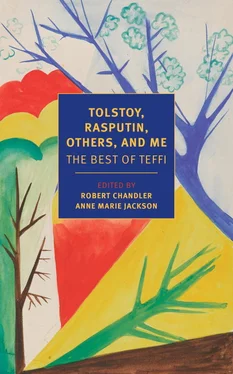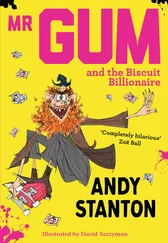Then, all of a sudden, the letters stopped. The “gentleman from Gorky” arrived, very agitated. He and his friends knew that an important letter had been dispatched the week before, and that Linyov hadn’t passed it on. In general, letters had started to go missing. What was going on? They had to get to the bottom of things immediately.
“Have there been any letters?” I asked Linyov.
“Of course there have,” said Linyov, “As it happens, they were extremely interesting. As an experienced observer of provincial life, I simply had to print the material.”
“But you were warned that it was all pure fabrication,” I said. “How could you print it? Now you’ll get complaints!”
“I’m already getting complaints. However, as an experienced observer… anyway, it’s over now. There haven’t been any more letters.”
I looked into his tray. The first thing I saw was a letter with the date underlined.
“What about this?” I asked. “And here’s another, and another.”
“Oh, those!” His manner was blasé. “You can have them. I’ve used them already.”
Later that day I passed on the letters to the “gentleman from Gorky”. He was overjoyed and then, to my surprise, he asked for a candle. He lit the candle, and began to heat the letter over the flame.
“What are you doing?” I asked.
“What do you think I’m doing? I’m developing it.”
So that was what was going on! Between the lines of the letter, yellow words began to appear. Familiar words: “co-optation”, “mandate”, “Mensheviks”.
Three days later, Linyov rushed in. His hair was on end, his coat gaping open, and he had the face of a man who has just jumped off a cliff into the sea.
He was shouting, “I have a daughter! I may not have seen her for fifteen years, but I’m a father, I’ll have you know.”
“What’s happened to your daughter?”
“I’ll tell you what’s happened to her,” he said. “Her only father is about to be ruined by you and your friends. Make no mistake! Those letters! Gorky will drag me to the guillotine!”
“Don’t take on so. We don’t have the guillotine here. We’re not in France.”
“It makes no difference. You tell Gorky from me that I have a daughter!”
I promised I would pass on the message, and Linyov rushed off again, forgetting his briefcase and gloves.
I told the “gentleman from Gorky”, and that was the end of the matter.
•
For some time now there had been talk in literary circles of the need to start a newspaper. The poet Minsky had been granted the necessary permission, [19] To start a newspaper, one required official permission from the Ministry of the Interior.
but he had no money. Some capitalist showed up and arranged a meeting, to which our friend K.P., who knew him, was invited. Although the plans being discussed were quite innocuous, suddenly the police burst in and arrested everybody. Nobody had done anything wrong, but the police dealt with them very harshly. Those arrested were taken to Marshal Baroch, who was well known for his bully-boy tactics. He yelled, stamped his feet and threatened to let them all rot in jail. K.P. replied, calmly, “That’s fine, but I need to make a call to my father.”
“Call him! Feel free!” yelled Baroch. “And I’ll let him know just what sort of a son he has. He’d better watch out, too!”
In those days, you had to give the number to a switchboard operator who would put you through. When K.P. gave the girl his father’s number, Marshal Baroch gave a start.
“Is that Senator P.’s apartment?” K.P. asked over the phone.
Baroch jumped to his feet.
“Igor, is that you?” continued K.P. “Could you tell father that I’ve been arrested and that Marshall Baroch is acting the fool?”
Marshall Baroch didn’t say a word. Shamefaced, he slunk out of the room.
K.P. was released that day. The others were kept for three days.
That was the last we saw of the capitalist, and the dream of starting a newspaper was dashed.
But then fresh hope dawned. Gorky began talks with Minsky. Getting permission to start a new paper was difficult; it was easier to try to make use of the permission already granted to Minsky. Gorky found the money, and Minsky was to be the editor. The literary section would include Gorky, Zinaida Gippius (both as a poet and as a literary critic, under the pseudonym “Anton the Extreme”) and myself. The paper would take its political direction from the Social Democrats, under the leadership of Lenin. Rumyantsev was to be editorial secretary and the managing editor would be Litvinov, whom we all nicknamed Papasha (“Daddy”).
Our future secretary found a superb building on Nevsky Prospekt for our editorial office, with a grand entrance onto the street and a uniformed doorman. Everybody was very excited.
Minsky found the slogan “Workers of the World Unite” a great source of inspiration. Realizing that the phrase was pleasingly metrical, he composed an anthem:
Workers of the world—unite!
Ours the strength, the power, the will.
Time to face our final fight,
When our enemy shall fall.
Form a chain about the globe
Let us, chanting with one voice,
March as one against our foe
Till in victory we rejoice.
All our foe held in his hands
We now claim as our birthright.
We’ll take the red sun for our flag.
Workers of the world—unite! [20] Clearly Minsky’s poem had some success. There is at least one account of an educated person being convinced that it was Minsky, rather than Marx, who first came up with the phrase “Workers of the World Unite” (Korney Chukovsky, diary entry for 13th September 1927, in Dnevnik 1901–1929 by Korney Chukovsky (Moscow: Sovremenny pisatel, 1997), pp. 413–4).
This anthem was printed in the first edition of the paper, which was called New Life .
New Life aroused a great deal of interest. The first issue went on sale at a price of three roubles. All the copies were snapped up almost immediately, that same evening. Our political directors were jubilant. They thought that they were the reason for the paper’s success.
“Our comrades, the workers, have shown their support!”
Sadly, the workers had in fact remained loyal to the Petersburg Gazette , which was printed on a special type of paper ideal for rolling cigarettes. It was the intelligentsia, needless to say, that was interested in our new paper. They were intrigued by the novelty of a collaboration between the Social Democrats and the Decadents (Minsky and Gippius), not to mention Gorky.
•
Strange characters began to appear in our magnificent editorial office. They whispered in corners and exchanged meaningful looks with one another.
No one in the world of journalism knew who these people were. Even the king of Russian reporters, Lvov-Klyachko, who knew literally everyone and everything, could only look at them and shrug. It seemed that they were there at the invitation of Rumyantsev. But when we asked him who they were, he smiled slyly and said, “Wait and see.”
These new people had not actually begun to work; they were merely conferring, making preparations.
And then who should turn up but my old friend Yefim, the same Yefim who, while languishing in a tsarist jail, had eaten goose for Christmas. Or, as he put it, “gooses”.
Yefim, smiling bashfully, announced that he had an idea for a political article.
“So far I’ve only got as far as the title: ‘Plehve and his Slaves’. [21] The title of the original is “Plehve and his Chaff” (“ Pleve i ego pleveli ”). Viacheslav von Plehve (1846–1904), Russian Minister of the Interior, was assassinated in 1904 in St Petersburg by a terrorist bomb.
I’d like to get it printed as soon as possible.”
Читать дальше












